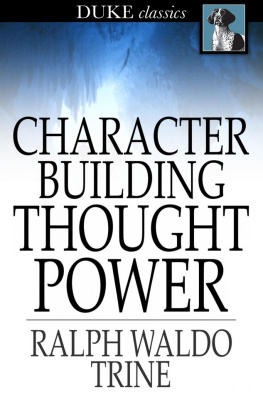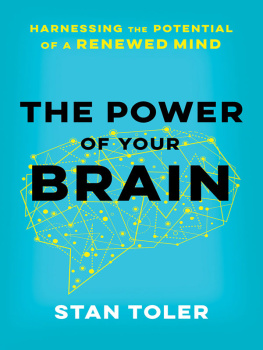CHARACTER BUILDING THOUGHT POWER
* * *
RALPH WALDO TRINE
*
Character Building Thought Power
First published in 1900
ISBN 978-1-62011-551-0
Duke Classics
2012 Duke Classics and its licensors. All rights reserved.
While every effort has been used to ensure the accuracy and reliability of the information contained in this edition, Duke Classics does not assume liability or responsibility for any errors or omissions in this book. Duke Classics does not accept responsibility for loss suffered as a result of reliance upon the accuracy or currency of information contained in this book.
*
UNCONSCIOUSLY we are forming habits every moment of our lives. Some arehabits of a desirable nature; some are those of a most undesirable nature. Some,though not so bad in themselves, are exceedingly bad in their cumulative effects,and cause us at times much loss, much pain and anguish, while their oppositeswould, on the contrary, bring as much peace and joy, as well as a continuallyincreasing power. Have we it within our power to determine at all times what typesof habits shall take form in our lives? In other words, is habit-forming, character-building,a matter of mere chance, or have we it within our own control? We have,entirely and absolutely. "I will be what I will to be," can be said and should be saidby every human soul.
After this has been bravely and determinedly said, and not only said, but fullyinwardly realized, something yet remains. Something remains to be said regardingthe great law underlying habit-forming, character-building; for there is a simple,natural, and thoroughly scientific method that all should know. A methodwhereby old, undesirable, earth-binding habits can be broken, and new, desirable,heaven lifting habits can be acquired, a method whereby life in part or inits totality can be changed, provided one is sufficiently in earnest to know and,knowing it, to apply the law.
Thought is the force underlying all. And what do we mean by this? Simply this:Your every act - every conscious act - is preceded by a thought. Your dominatingthoughts determine your dominating actions. In the realm of our own minds wehave absolute control, or we should have, and if at any time we have not, thenthere is a method by which we can gain control, and in the realm of the mindbecome thorough masters. In order to get to the very foundation of the matter,let us look to this for a moment. For if thought is always parent to our acts, habits,character, life, then it is first necessary that we know fully how to control ourthoughts.
Here let us refer to that law of the mind which is the same as is the law in Connectionwith the reflex nerve system of the body, the law which says that wheneverone does a certain thing in a certain way it is easier to do the same thing in thesame way the next time, and still easier the next, and the next, and the next, untilin time it comes to pass that no effort is required, or no effort worth speaking of;but on the opposite would require the effort. The mind carries with it the powerthat perpetuates its own type of thought, the same as the body carries with itthrough the reflex nerve system the power which perpetuates and makes continuallyeasier its own particular acts. Thus a simple effort to control one's thoughts,a simple setting about it, even if at first failure is the result, and even if for a timefailure seems to be about the only result, will in time, sooner or later, bring him tothe point of easy, full, and complete control. Each one, then, can grow the powerof determining, controlling his thought, the power of determining what types ofthought he shall and what types he shall not entertain. For let us never part inmind with this fact, that every earnest effort along any line makes the end aimedat just a little easier for each succeeding effort, even if, as has been said, apparentfailure is the result of the earlier efforts. This is a case where even failure is success,for the failure is not in the effort, and every earnest effort adds an incrementof power that will eventually accomplish the end aimed at. We can, then, gain thefull and complete power of determining what character, what type of thoughts weentertain.
Shall we now give attention to some two or three concrete cases? Here is a man,the cashier of a large mercantile establishment, or cashier of a bank. In his morningpaper he reads of a man who has become suddenly rich, has made a fortune ofhalf a million or a million dollars in a few hours through speculation on the stockmarket. Perhaps he has seen an account of another man who has done practicallythe same thing lately. He is not quite wise enough, however, to comprehend thefact that when he reads of one or two cases of this kind he could find, were he tolook into the matter carefully, one or two hundred cases of men who have lost allthey had in the same way. He thinks, however, that he will be one of the fortunateones. He does not fully realize that there are no short cuts to wealth honestlymade. He takes a part of his savings, and as is true in practically all cases of thiskind, he loses all that he has put in, Thinking now that he sees why he lost, andthat had he more money he would be able to get back what he has lost, and perhapsmake a handsome sum in addition, and make it quickly, the thought comesto him to use some of the funds he has charge of. In nine cases out of ten, if notten cases in every ten, the results that inevitably follow this are known sufficientlywell to make it unnecessary to follow him farther.
Where is the man's safety in the light of what we have been considering? Simplythis: the moment the thought of using for his own purpose funds belonging to othersenters his mind, if he is wise he will instantly put the thought from his mind.If he is a fool he will entertain it. In the degree in which he entertains it, it willgrow upon him; it will become the absorbing thought in his mind; it will finallybecome master of his will power, and through rapidly succeeding steps, dishonor,shame, degradation, penitentiary, remorse will be his. It is easy for him to put thethought from his mind when it first enters; but as he entertains it, it grows intosuch proportions that it becomes more and more difficult for him to put it fromhis mind; and by and by it becomes practically impossible for him to do it. Thelight of the match, which but a little effort of the breath would have extinguishedat first, has imparted a flame that is raging through the entire building, and nowit is almost if not quite impossible to conquer it.
Shall we notice another concrete case? A trite case, perhaps, but one in which wecan see how habit is formed, and also how the same habit can be unformed. Hereis a young man, he may be the son of poor parents, or he may be the son of richparents; one in the ordinary ranks of life, or one of high social standing, whateverthat means. He is good hearted, one of good impulses generally speaking, a goodfellow. He is out with some companions, companions of the same general type.They are out for a pleasant evening, out for a good time. They are apt at times tobe thoughtless, even careless. The suggestion is made by one of the company, notthat they get drunk, no, not at all; but merely that they go and have something todrink together. The young man whom we first mentioned, wanting to be genial,scarcely listens to the suggestion that comes into his inner consciousness that itwill be better for him not to fall in with the others in this. He does not stop longenough to realize the fact that the greatest strength and nobility of character liesalways in taking a firm stand on the aide of the right, and allow himself to beinfluenced by nothing that will weaken this stand. He goes, therefore, with hiscompanions to the drinking place. With the same or with other companions thisis repeated now and then; and each time it is repeated his power of saying "No"is gradually decreasing. In this way he has grown a little liking for intoxicants,and takes them perhaps now and then by himself. He does not dream, or in theslightest degree realize, what way he is tending, until there comes a day when heawakens to the consciousness of the fact that he hasn't the power nor even theimpulse to resist the taste which has gradually grown into a minor form of cravingfor intoxicants. Thinking, however, that he will be able to stop when he is reallyin danger of getting into the drink habit, he goes thoughtlessly and carelessly on.











